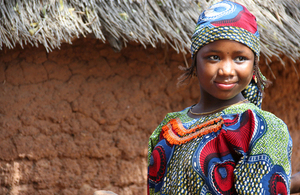The Coca-Cola company and the UK government strengthen girls’ education and economic opportunities in Nigeria
Coca-Cola and DFID to invest £7 million in an initiative to help 10,000 marginalised girls in Nigeria.

A young woman in Nigeria. Picture: Lindsay Mgbor/DFID
The Coca-Cola Company and the UK Department for International Development (DFID) have joined forces to bolster the educational and economic opportunities of more than 10,000 marginalised girls and young women in Nigeria.
Together, The Coca-Cola Company and DFID will invest nearly £7 million in an initiative known as “ENGINE” (Educating Nigerian Girls in New Enterprises). The investment comes as part of the UK Government’s Girls’ Education Challenge and The Coca-Cola Company’s 5by20 initiative, which seeks to enable the economic empowerment of 5 million female entrepreneurs across the global Coca-Cola value chain by 2020.
Justine Greening, the UK International Development Secretary said:
Research has shown that girls with an education have healthier children and reinvest 90 per cent of income in their family and their community. By capitalising on the business expertise of The Coca-Cola Company and other enterprises, we are helping girls realise their full potential and ultimately build a better future for themselves, their families, and their communities.
ENGINE will establish over 170 learning spaces where girls and young women between the ages of 16 and 19 will meet for academic support and training sessions over a nine-month period. Approximately 5,400 girls who are still in school will receive after-school tutoring, as well as training to advance their leadership and entrepreneurship skills. Additionally, a vocational training programme focused on business and employment readiness will be offered to approximately 12,600 young women who are currently out of school. Young women who complete the vocational training programme will have the opportunity to choose from a variety of employment opportunities, including receiving assistance to set up their own businesses as micro-retailers of Coca-Cola and d.light products.
The global humanitarian agency Mercy Corps will manage the implementation of ENGINE, with support from the Nike Foundation, solar social enterprise d.light and other partners.
Adeola Adetunji, Managing Director, Coca-Cola Nigeria Limited said:
At Coca-Cola, we believe that our business is only as strong and sustainable as the communities in which we operate, and that investing in women’s education and careers spurs economic growth and fosters sustainable development. This partnership demonstrates Coca-Cola’s belief that many of the world’s most pressing challenges can best be addressed by governments, business and civil society working together as partners to create lasting, sustainable solutions.
Neal Keny-Guyer, Chief Executive Officer, Mercy Corps said:
ENGINE and other similar programmes generate what we call shared value: businesses and communities recognising their common interests and working together to accomplish what neither could have achieved alone. This program engages not only the girls and young women who take part, but also their families, schools and community leaders, creating positive role models to inspire young women, no matter where life takes them.
Notes to editors
-
The UK Government has prioritised girls’ education as one of the four pillars of the Women and Girls Strategy. In September 2011, the Deputy Prime Minister announced the £355 million Girls’ Education Challenge – the largest ever global fund dedicated to girls’ education – calling on NGOs, charities and the private sector to find better ways of getting girls in school and ensuring they receive a quality of education to transform their future.
-
The Girls’ Education Challenge in total will help up to one million of the world’s poorest girls to have an opportunity to improve their lives through education in 22 focus countries, leverage additional resources for girls’ education from the private sector and develop new knowledge on cost effective programming.
-
The Coca-Cola Company has been awarded funding through the Strategic Partnerships Window for the most innovative, effective and well evaluated pilot projects that support marginalised girls and young women to succeed in their education. These are the first partnerships of their kind between DFID and the private sector and bring DFID and global business together to deliver education solutions for marginalised girls.
-
More information about The Coca-Cola Company’s 5by20 initiative can be found at www.5by20.com
-
The Nike Foundation supports the girl effect: the unique potential of adolescent girls to end poverty for themselves and the world. Learn more at girleffect.org
-
Mercy Corps is a leading global humanitarian agency saving and improving lives in the world’s toughest places. Learn more at mercycorps.org
General media queries (24 hours)
Email mediateam@dfid.gov.uk
Telephone 020 7023 0600
If you have an urgent media query, please email the DFID Media Team on mediateam@dfid.gov.uk in the first instance and we will respond as soon as possible.